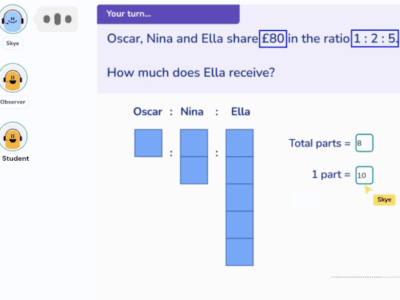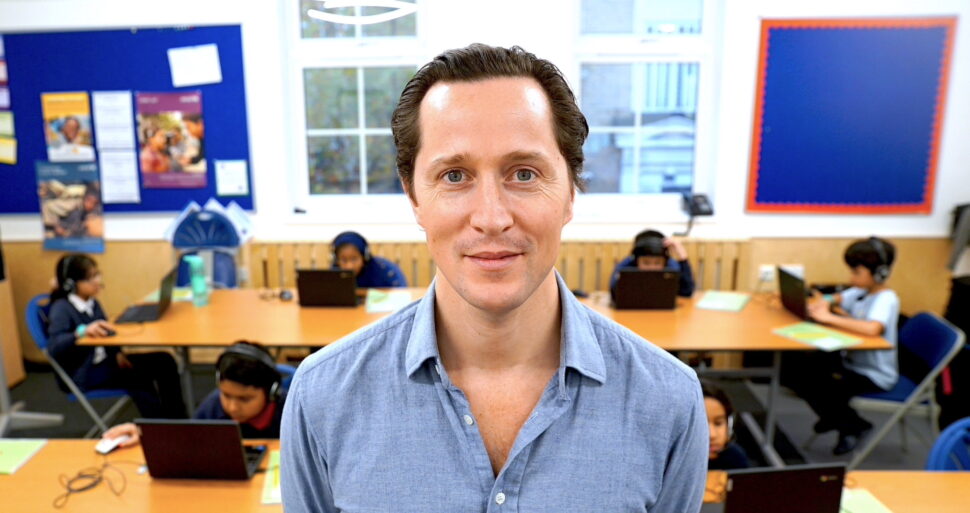Companies are launching AI tutors with the promise they could “transform how we can close the attainment gap” and reach children traditionally excluded from private tuition.
Third Space Learning, an in-house maths tutoring company, will become the first to replace its human tutors with an AI model called Skye this September to 200 schools.
It is one of many businesses experimenting with the technology to deliver tutoring with what they argue has faster personalisation, greater flexibility and at a fraction of the cost of in-person tutoring.
Another business, Educate me AI, founded by a teacher, data analyst and social worker from Northampton, works by “supplementing” human tutoring with AI-generated content, quizzes, and flashcards.
But critics have warned AI “can’t replace that connection or trust” of one-to-one tutoring and could even “create risks for the future of education”.
‘Transform the attainment gap’
In 2013 the Sutton Trust found private tuition has become “increasingly popular”, but is “creating a two-tier system, with wealthier families able to pay to secure their children advantages that poorer families simply can’t afford”.
While tutoring is often paid-for by parents outside of school hours, Third Space Learning (TSL) works with schools to deliver timetabled tutoring sessions for targeted children.

Tom Hooper, chief executive of TSL, said with school budgets in an “incredibly challenging position”, tens of thousands of children could be supported by using AI tutoring.
TSL offers an unlimited number of sessions for year 4 to 6 pupils in primary schools for between £3,000 and £6,000, depending on school size. There is a £5,000 fixed price for secondary schools.
Hooper said the move could “transform how we can close the attainment gap…we’ve got a long way to go, but it’s within touching distance”.

Admirals Academy in Norfolk, which was part of TSL’s AI trials, said the cost savings have been “massive” and it was a “no brainer” to continue using it.
Deputy Headteacher Chris Harris told Schools Week he used to spend around £3,000 for around ten children to have sessions per year. Now, he spends £5,000 for an unlimited number of sessions for every child in the school.
Rejaul Amin, co-founder of tutoring app Educate me AI, said the technology could be used to “empower every learner, regardless of their postcode, privilege or learning style”.
His app was launched in April to around 100 students at tuition centres in Northampton and Peterborough, with plans to launch online in September. It offers features from £9.99 a month.
‘Not like Chat GPT’
Hooper stressed his model was the “opposite” to experiences of large language models like ChatGPT, as children aren’t told the answers – but rather prompted to work it out, speaking aloud to Skye.
The curriculum-aligned lessons are “built by teachers”, who consistently review content and sessions.
Data from 2,600 TSL tutoring sessions found children who learned with Skye had slightly higher post-session assessment scores than those who learnt with human tutors.
Some parents will worry about their children interacting with more technology. But Harris suggested his pupils responded better to a “robot”, and felt “less judged” than if they were with a human tutor.
Amin from Educate me AI said today’s pupils were now using AI “to their disadvantage”, allowing them to “cheat their way through life”.
By creating a contained model based on the national curriculum, Amin argued content would be 100 per cent accurate – without random facts drawn from the internet.
Would AI tutoring replace human tutors?
The inevitable question surrounding every debate about AI is whether it is ethical to replace something traditionally delivered by people with technology.
Both TSL and Educate me AI have stressed they don’t want human tutoring to be fully replaced by AI. Rather, its use can help those who can’t afford it, or supplement those already receiving it.
While TSL is replacing its human tutors – graduates and undergraduates recruited from India and Sri Lanka – Hooper claimed they were “very understanding and supportive” of the move and “excited by what lies ahead”.

Hooper wouldn’t disclose the number of tutors that won’t have part time employment now.
But he said the shift to AI “will allow us to move from supporting thousands of students this year, to supporting tens of thousands of students next year, and all whilst reducing the cost of tutoring for schools”.
However, the jury is out for Poppy Parmar-Phillips, whose tutoring business supports neurodiverse children.
She agreed AI had a “vital role” to play in making tutoring more efficient, but it “can’t replace that connection or trust” between a teacher and a learner.
“So much of education is emotional, it shouldn’t be just academic,” she explained. “When a tutor has a connection with a student, especially someone who is struggling with self-esteem or motivation, that weekly check in [with a tutor] can be really helpful.”
‘Risks for the future of education’
Jen Persson, director of Defend Digital Me, said there were “risks for the future of education, for staff and for pupils” by replacing human tutors with AI.
“Replacing human tutors can risk eroding the relational, ethical, and democratic dimensions of education, reducing learners to data points rather than supporting their holistic learning and development.
“Depending on expectations of how much it is used across a whole day and experience of education, it could well be the case that some families will ask why bother sending a child to school at all, if they just sit in front of a screen and could do that at home?”
She warned of risks around safeguarding and data protection, and said models must be rooted in human rights frameworks with clear accountability and consent from parents.

Harris said parents, who all signed consent forms for Skye, were “very keen for their children to be part of it – not just for academic benefits, but for something that’s trailblazing for the future”.
Another important factor is how well the models work, Ben Gadsby from education charity Impetus said, as otherwise it wasn’t worth using technology over people.
Gadsby added it was “reassuring that the organisations working on this have a track record of effective tutoring”.
But “until AI can reliably keep pupils engaged, encourage resilience and establish trust, it is much more likely to augment human tutors than replace them”.








So education will prepare young people for their future role in society – data entry operatives for the platforms which are the real agents in society and the economy, leaving us as the squishy biological components of the process.
Dystopia is now.
Just one more edutech solution like the many others in the past that will do nill or improve nill. Attainment issues are related to broader social and cultural issues exacerbated by corrosive predatory technology such as tiktok and social media. Students sat in front of this AI will be just as incapable of accessing it as they would their lessons and human tutors if none of the other issues are addressed.
As a dedicated tutor who contributed to over 4,000 mathematics sessions through Third Space Learning, I must respectfully disagree with the statement made by Mr. Hooper. The claim that tutors—particularly those from India and Sri Lanka—were “understanding and supportive” of the sudden replacement by AI is not reflective of my experience or the sentiments shared by many peers.
There was no meaningful consultation or advance notice. We were not offered the opportunity to transition or retrain, and the tone of the communication was dismissive of the human effort that helped build the success of the very AI platform now replacing us.
I fully support the ethical use of AI in education. However, replacing human educators without transparency, dignity, or acknowledgment of their contribution undermines the very values education should uphold.
I speak not just for myself but for those whose voices may be unheard. Compassion must lead innovation—not convenience or cost-cutting alone.